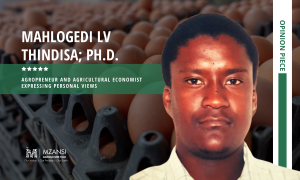THERE IS LIGHT AT THE END OF THE PANDEMIC IN SOUTH AFRICAN POTATO INDUSTRY

Covid-19 has forced many countries, including South Africa to close their borders as a prevention measure to minimize the spread of the virus. South Africa has been on lockdown for more than 70 days now, and is slowly reopening the economy by easing some lockdown restrictions.
Due to the lockdown and ban of other economic activities, the agricultural sector was affected, in particular the demand side of the agricultural value chains. One of the most affected agricultural industries is the Potato. The closure of fast-food outlets, restaurant, hotels and informal trading has heavily affected the potato demand, which consequently has suppressed the potato Producer prices. The average price of the potatoes in the Fresh produce markets changed from R49.50 in January 2020 to R37,95 in May 2020. Furthermore, statistics shows that in February 2020 sales were high by 1,08% compare to February 2019. On April 2020, the trend displayed a drastically decline by 11,12% equate to 2019 results. In addition, even Mondial the main S.A cultivar producer has drop their prices by R12,13 per bag. However, it is expected on level-3 for potato to regain its momentum demand. There is a huge backlog of potato exportation to the neighbouring countries like (Namibia, Botswana, and Swaziland), Western African countries (Ghana and Congo) and Middle East (Qatar and Oman). While the domestic market is struggling with demand slump, the imports of processed potatoes like potato chips poses a significant threat to the survival of local potato farmers. It is essential that trade remedies within the ambit of South Africa’s commitment to international trade agreement are used to support local potato farmers.
Potato is the leading consumable vegetable in the country and globally, because of its affordability and nutrients rich (starch and proteins) . In South Africa potato contributes about 45% of the vegetable sales and is a key product that is produced by both commercial and emerging farmers. For the past decade, the potato industry has witnessed a steady growth of 3% per annum on average. This can be attributed to industry investments in latest seed technology that improves yields and reduce diseases, production practises that enhance quality and food safety. Today, South Africa is ranked 28th internationally with a global production share of 0.3%, equivalent to 2 million tons produced yearly. The industry operates on a 50 000 hectares across the country, with Free State as a key player. In the continent, the country remain the second largest exporter with a 11% export share driven by with 650 commercial farmers and 1000 of developing farmers.
In the age of Covid-19 pandemic times, food industry has received a new appreciation of the critical importance of the people behind food production and distribution networks. In conclusion, Covid-19 can be used as a catalyst of change for agricultural sector to anticipate for future pandemics. Advanced facilities must be constructed to improve shelf life of perishable products. Success to a sustainable food production will enhance the quality of life. To sum up the above, national planning and policy making in areas such as agricultural production; investment, budgeting, research and development, regional integration and trade policy should be driven to reshape food security prospects.
By Thabiso Mdletshe,
Agriculturist,
Email: thabisomdletshe96@gmail.com
Disclaimer: The views and opinions expressed in this article are those of the author and do not necessarily reflect the official policy or position of Mzansi Agriculture Talk.



















